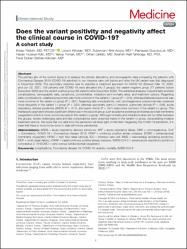| dc.contributor.author | Yıldırım, Erkan | |
| dc.contributor.author | Kılıçkan, Levent | |
| dc.contributor.author | Aksoy, Süleyman Hilmi | |
| dc.contributor.author | Gözüküçük, Ramazan | |
| dc.contributor.author | Kılıç, Hasan Hüseyin | |
| dc.contributor.author | Tomak, Yakup | |
| dc.contributor.author | Dalkılıç, Orhan | |
| dc.contributor.author | Tanboğa, İbrahim Halil | |
| dc.contributor.author | Kılıçkan, Fevzi Duhan Berkan | |
| dc.date.accessioned | 2023-03-16T12:17:28Z | |
| dc.date.available | 2023-03-16T12:17:28Z | |
| dc.date.issued | 2023 | en_US |
| dc.identifier.citation | Yildirim, E., Kilickan, L., Aksoy, S. H., Gozukucuk, R., Kilic, H. H., Tomak, Y., Dalkilic, O., Tanboga, I. H., & Kilickan, F. D. B. (2023). Does the variant positivity and negativity affect the clinical course in COVID-19?: A cohort study. Medicine, 102(9), e33132. https://doi.org/10.1097/md.0000000000033132 | en_US |
| dc.identifier.uri | http://dx.doi.org/10.1097/MD.0000000000033132 | |
| dc.identifier.uri | https://hdl.handle.net/20.500.12941/123 | |
| dc.description.abstract | The primary aim of the current study is to analyze the clinical, laboratory, and demographic data comparing the patients with Coronavirus Disease 2019 (COVID-19) admitted to our intensive care unit before and after the UK variant was first diagnosed in December 2020. The secondary objective was to describe a treatment approach for COVID-19. Between Mar 12, 2020, and Jun 22, 2021, 159 patients with COVID-19 were allocated into 2 groups: the variant negative group (77 patients before December 2020) and the variant positive group (82 patients after December 2020). The statistical analyses included early and late complications, demographic data, symptoms, comorbidities, intubation and mortality rates, and treatment options. Regarding early complications, unilateral pneumonia was more common in the variant (−) group (P = .019), whereas bilateral pneumonia was more common in the variant (+) group (P < .001). Regarding late complications, only cytomegalovirus pneumonia was observed more frequently in the variant (−) group (P = .023), whereas secondary gram (+) infection, pulmonary fibrosis (P = .048), acute respiratory distress syndrome (ARDS) (P = .017), and septic shock (P = .051) were more common in the variant (+) group. The therapeutic approach showed significant differences in the second group such as plasma exchange and extracorporeal membrane oxygenation which is more commonly used in the variant (+) group. Although mortality and intubation rates did not differ between the groups, severe challenging early and late complications were observed mainly in the variant (+) group, necessitating invasive treatment options. We hope that our data from the pandemic will shed light on this field. Regarding the COVID-19 pandemic, it is clear that there is much to be done to deal with future pandemics. | en_US |
| dc.language.iso | eng | en_US |
| dc.publisher | Lippincott Williams and Wilkins | en_US |
| dc.relation.isversionof | 10.1097/MD.0000000000033132 | en_US |
| dc.rights | info:eu-repo/semantics/openAccess | en_US |
| dc.subject | Complications | en_US |
| dc.subject | Coronavirus disease 19 | en_US |
| dc.subject | COVID-19 variants | en_US |
| dc.subject | Mortality | en_US |
| dc.subject | SARS-CoV-2 | en_US |
| dc.title | Does the variant positivity and negativity affect the clinical course in COVID-19?: a cohort study | en_US |
| dc.type | article | en_US |
| dc.authorid | Süleyman Hilmi Aksoy / 0000-0002-2356-0268 | en_US |
| dc.authorid | Ramazan Gözüküçük / 0000-0002-8205-4752 | en_US |
| dc.department | Meslek Yüksekokulları, Meslek Yüksekokulu, Tıbbi Görüntüleme Teknikleri Programı | en_US |
| dc.contributor.institutionauthor | Aksoy, Süleyman Hilmi | |
| dc.contributor.institutionauthor | Gözüküçük, Ramazan | |
| dc.identifier.volume | 102 | en_US |
| dc.identifier.issue | 9 | en_US |
| dc.identifier.startpage | 1 | en_US |
| dc.identifier.endpage | 8 | en_US |
| dc.relation.journal | Medicine | en_US |
| dc.relation.publicationcategory | Makale - Uluslararası Hakemli Dergi - Kurum Öğretim Elemanı | en_US |

















